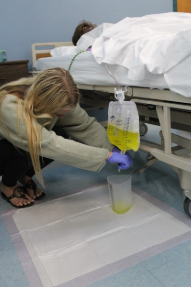Future Caregivers in Training by Chloe Strong
The nursing program was designed to give students both knowledge and experience that prepared them for a successful career in healthcare. One of the main advantages of the program was the opportunity to gain real-world clinical practice, which helped students build confidence and learn essential skills they could apply directly in patient care. Senior Madilyn McGrath said, “I would say some key features and benefits of the nursing program included hands-on patient/clinical experience and obtaining your CNA license all at a considerably low cost.” This reflected the true value of the program, as it not only provided the chance to earn a Certified Nursing Assistant license, but it also did so at an affordable price, making it accessible to many.
Another important part of the nursing program was the variety of clinical rotations that gave students firsthand experience in different healthcare environments. McGrath said, “Throughout the year, we had two different clinical rotations. In the fall we went to a nursing home/center for about a month, and then in the spring we went to Holmes Regional for another month.” These rotations allowed students to work directly with patients in both long-term care and hospital settings, giving them a well-rounded perspective on the responsibilities of a CNA. By experiencing both types of facilities, students were better prepared to adapt to different healthcare environments and gained a deeper understanding of the diverse needs of patients.
The nursing program offered a comprehensive blend of education and hands-on experience that equipped students with the skills, confidence, and credentials needed for a successful healthcare career. Through affordable CNA training and diverse clinical rotations in both long-term care and hospital settings, students gained a well-rounded understanding of patient care and the ability to adapt to various healthcare environments. This combination of practical experience and accessible training underscored the program’s value in preparing competent and confident future healthcare professionals.
Caption:
Nursing In Training: Senior Maddie McGrath from the PCA program practiced carefully emptying a patient’s urinary drainage bag into a measuring container in the hospital lab. Wearing gloves and using proper technique, she learned how to measure and record output accurately. This hands-on training helped prepare students for real-world healthcare situations. The activity took place in the nursing lab, which was designed to simulate a hospital environment. McGrath said, “Some key features and benefits of the nursing program included hands-on patient/clinical experience.” Through experiences like this, students gained the confidence and skills needed to care for future patients. Photo by Renna Petrides

